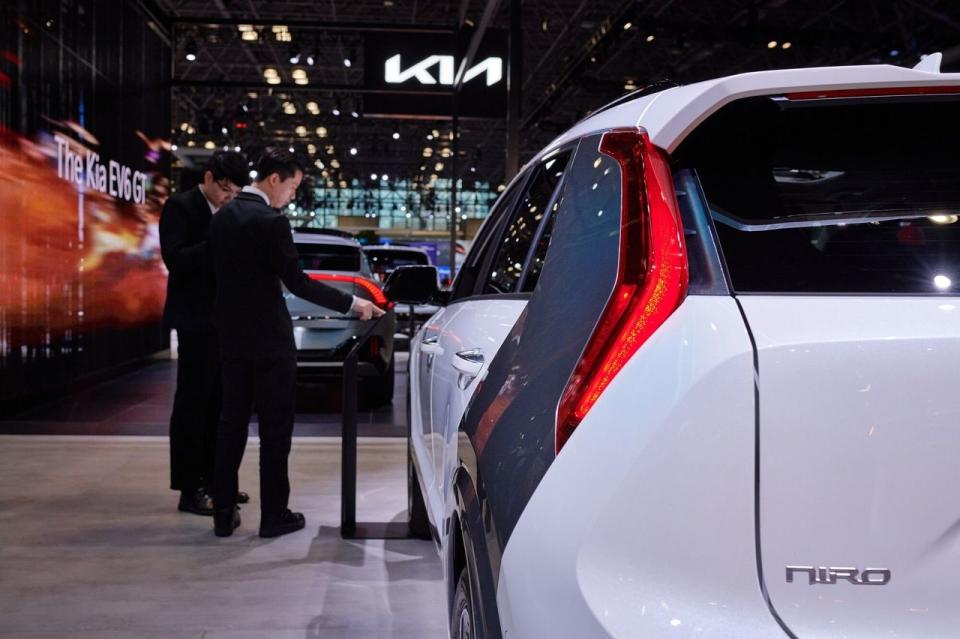Hyundai and Kia zip into the US car market's fast lane
South Korean automakers Hyundai and Kia already make some of America’s most popular cars, particularly in the hybrid category. Now geopolitics is helping them be even more competitive in the growing EV market.
Investors in the companies, which have designs and some ownership in common, have found themselves in the fast lane as a result. Shares of Hyundai Motor have gained 85% since the end of 2022 while those of Kia have more than doubled. Hyundai is Kia’s largest shareholder with a 34% stake. The two companies reported record earnings last year, with both increasing their operating profits by more than 50% from 2022.
Most Read from The Wall Street Journal
Boeing Talks to Buy Back Spirit AeroSystems Have Last-Minute Twist
How a Texas Factory Is Emerging as a Key Ammo Supplier for the U.S., Ukraine
Stephen A. Smith Is the Face of ESPN. How Much Is That Worth?
The U.S. has been the major growth driver for both companies as they have steadily increased their market share. Hyundai and Kia together have more than 10% of the U.S. market, according to Goldman Sachs. Their combined revenue in North America has doubled in the past five years alone. With lucrative sport utility vehicles such as the Tucson and the Santa Fe, Goldman estimates that the U.S. is their most profitable market.
Their success in green technology is helping: Nearly 8% of Hyundai’s cars sold in the U.S. last year were EVs. That proportion was even higher at 16% in more EV-friendly Europe. But they have also been offering a more balanced portfolio of products: Around 10% of Hyundai’s cars sold in the U.S. were conventional hybrids.
That is especially important as hybrid sales could grow faster in the next few years while consumers sit on the fence for the EV transition. Nomura expects global hybrid sales to grow an average 26% between 2023 and 2026, outpacing the 19% growth in pure EVs. Nomura predicts even faster growth of 34% in the U.S. market.
Geopolitics will provide another tailwind as affordable Chinese EVs face obstacles in America. Currently, EVs from the Korean automakers aren’t necessarily eligible for $7,500 tax credits under the Inflation Reduction Act, but that would change after Hyundai’s $7.6 billion manufacturing plant in Georgia opens later this year.
Booming India is becoming another important market for the Korean automakers. Hyundai plans to spin off a minority stake in its Indian unit in what could become the country’s largest-ever initial public offering, raising billions of dollars in the process. The companies have been moving their production capacity from China to India in the past decade—especially as the relationship between China and Korea has deteriorated.

Hyundai and Kia collectively are already the second largest automaker in India, with around a fifth of the market. Sales are mostly internal combustion engine vehicles. EVs and hybrids could be the next leg in their growth. EVs only accounted for 2% of the Indian market last year, according to Counterpoint Research, but sales nearly doubled in 2023 and the government said in March that it would cut import duties on some EVs for companies that invest at least $500 million to make their cars there.
That may lead to more competition from Chinese EV makers. BYD, for example, sells cars in India. But geopolitics might stymie Chinese players: The Indian government rejected BYD’s proposed $1 billion manufacturing plan last year.
That potential doesn’t come at a premium price: Hyundai and Kia both trade at around 5 times forward earnings, below most of their peers. Toyota, for example, fetches 9 times. Investors should at least consider a test drive.
Write to Jacky Wong at jacky.wong@wsj.com
